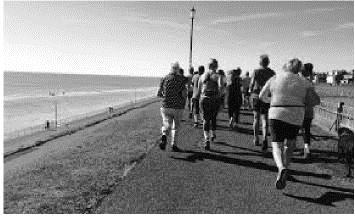|
‘Running’ in the New Testament
as published in Great Yarmouth Parish Life July 2019

Pam Spychal’s Reflections for July
I have done a bit of running (jogging really), on and off, since my mid-twenties. I have had a bit of a new lease of life in this regard, recently discovering joys of the Parkrun. Parkruns take place all over the country, and increasingly, all over the world, every Saturday morning at 9am. You signup online and turn up. It’s not a race and it doesn’t matter how fast or how slow you run, or walk. The distance is 5 kilometers or just over 3 miles. Our nearest Parkrun starts at the top of Gorleston Cliffs. There’s a handful of participants from the parish, so if you want to join us, we can guarantee a friendly face
Running has always had a spiritual dimension for me. Getting out into the fresh air and nature, forgetting the worries and stresses of the day, and having a bit of uninterrupted thinking time, is generally quite conducive to a prayerful state of mind. For this Reflection, I decided to look at how running is portrayed in the Bible. I could only think of one reference about running in the New Testament, Hebrews 12:2, where the writer exhorts us to “keep running in the race which lies ahead of us”
A closer look, armed with my New Testament Concordance*, revealed a total of 23 references to running. People clearly did a lot of running in the first century AD. I guess it was the quickest form of transport, if you were not lucky enough to own a horse and chariot. Running was actually the way people got from A to B. We don’t see so many people running these days in an everyday sort of way. This is not surprising, as now we have much more efficient modes of transport available. Running seems more or less confined to sport and exercise and often involves a circular route (or a treadmill), so you end up where you started!
Some of the Bible references were linked to events that are familiar, such as the healing and teaching Ministry of Jesus (Matthew 6:33), or his Crucifixion (Matthew 27:48) and Resurrection (Matthew 28:8), but one reference was a total surprise to me. This is the Story of Rhoda. I have never noticed it before, never heard it in church and certainly never heard a sermon based on it
 The Story of Rhoda Acts 12:12 - 16 The Story of Rhoda Acts 12:12 - 16
It was a time of persecution for Christians. Peter was in prison. A group of Christians were meeting together at Mary-the-mother-of-John-Mark’s house to pray. Peter was miraculously freed from prison and makes his way to the house
The writer of Acts takes up the story:
“He knocked at the outside door and a servant called Rhoda came to answer it. She recognised Peter’s voice and was so overcome with joy that, instead of opening the door, she RAN inside with the news that Peter was standing at the main entrance. They said to her, “You are out of your mind”, but she insisted that it was true. Then they said “It must be his angel!” Peter, meanwhile, was still knocking. When they opened the door, they were amazed to see that it really was Peter himself”
What a rollercoaster ride for poor Rhoda. How frightened she must have felt listening to the prayers of the faithful, while their leader was incarcerated in the fearsome King Herod’s prison. How embarrassed she must have felt when she realised she had left Peter standing at the door. How frustrated she must have felt when they didn’t believe her. But the overriding emotion, the thing she remembers most, as she surely must have recounted the anecdote to the writer of Acts, was the emotion of joy, which overcame her when she saw Peter
I love this story. A moment in time, an event in the life of a common servant girl, recorded for eternity, in the Biblical Canon of the Christian Church! It is so ordinary, but so uplifting – a bit like running, really
*Concordance: An alphabetical index of the words in the New Testament
The views carried here are those of the author, not of Network Yarmouth, and are intended to stimulate constructive and good-natured debate between website users
Click here to read our forum and comment posting guidelines
|
|
|
|